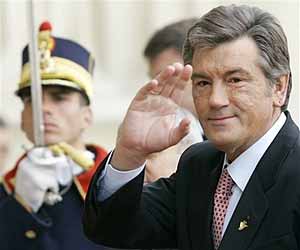12.04.2008
April 09, 2008 (the date of publication in Russian)
Alexander Rudakov
UKRAINE AS A BARGAINING CHIP
Washington hasn't yet decided how to make the most of it
 Ukraine's ruling establishment is still in a state of shock, ensuing after the results of the NATO summit in Bucharest were made public. Until recent time, their picture of the universe was as plain as the trajectory of a cockroach moving from a dustbin to a fridge. This picture involved: Russia, an ugly outsider of the European civilization; NATO, a prestigious club of civilized nations; and Ukraine in the center, the whole humanity watching it solemnly crawl over the club's shining threshold.
Ukraine's ruling establishment is still in a state of shock, ensuing after the results of the NATO summit in Bucharest were made public. Until recent time, their picture of the universe was as plain as the trajectory of a cockroach moving from a dustbin to a fridge. This picture involved: Russia, an ugly outsider of the European civilization; NATO, a prestigious club of civilized nations; and Ukraine in the center, the whole humanity watching it solemnly crawl over the club's shining threshold.
For President Viktor Yushchenko, the major annoying obstacle was his own people, not much enthusiastic about entry in NATO – in his perception, definitely due to insidious Russian influence. However, the helpful patron, Mr. George W.Bush, carelessly advised him a flight-forward tactic, promising firm support in case he provides not more than three signatures of top statesmen, including his own, in favor of joining NATO's Membership Action Plan. Yushchenko, as a perfectly obedient apprentice of democracy, could not disobey his master. In early March, he undertook all possible efforts to obtain the signature of his Prime Minister and arch-rival Yulia Timoshenko. For this purpose, he gave away a convenient Leonid Chernovetsky, Mayor of Kiev, allowing Mrs. Timoshenko to promote "a man of her own" (in Ukrainian media, every politician is described as "a man of someone") to his position.
Obviously, Victor Yushchenko believed that for George W. Bush, Ukraine's membership in NATO is a cause as vital as for himself. However, Ukraine's NATO bid was utilized by the White House for a different purpose. In Washington's view, Ukraine was regarded as a convenient "bargaining chip" in a much more significant issue: deployment of ABM systems in Eastern Europe.
In fact, the countries of "Old Europe" encountered a dilemma in Bucharest: either to continue expressing skepticism over ABM deployment, or to show the door to Ukraine's Yushchenko and Georgia's Mikhail Saakashvili. After all, NATO members can't oppose Washington in every issue, as NATO summits are convened in order to consolidate, not to weaken the club – which means compromises that always suppose sacrifice.
Germany and France had been opposed both to ABM deployment in Poland and Czech, and to EU expansion to the east. Being interested in at least relative stability in Ukraine, a currently indispensable fuel transit territory, Germany and France were not enthusiastic over political moves irritating the Ukrainian majority. In addition, they could not rely upon the increasingly unpopular Yushchenko, too much reminding the thickheaded nuisance of Lech Kaczynski.
In fact, the compromise satisfied all the sides except Ukraine and Georgia. In exchange for giving away Kiev's desperate bid, Bush managed to succeed in pushing the interests of the US military industrial complex, today's Republican Party serving as its superstructure. At the summit, the ABM project gained nominal support from NATO's collective spirit, thus being relieved of an inept label of a US cowboy's idée fixe .
In their turn, Nicolas Sarkozy and Angela Merkel are likely to use Washington's ostensible concession in the Ukrainian issue for further demonstration of independence in decision-making, particularly in affairs concerning the former USSR.
For the Ukrainian elites, this deal is an unpleasant discovery. They had been sincerely convinced that the whole West is preoccupied with a single issue: that is, how to hurt Russia as bitterly as possible. In fact, the Western camp appeared to be populated by quite pragmatic people who bargain with one another, but not to the extent of quarrel; who often dislike Russia, but not to the extent of missing their own profit.
The second, even more unpleasant discovery for the Kiev establishment is the role in which Ukraine is utilized by Washington in geopolitical affairs. It is not at all the role of an indispensable ally of America. A long-term US strategy, designed to weaken Russia and gain control over its natural reserves, does not necessarily suppose Ukraine's integration in NATO. Kiev is more convenient as a mere instrument of bargain.
To a great disappointment of Kiev, the United States has demonstrated that Ukraine is not a subject of its passion and not a even focus of primary attention. Washington's treatment of Kiev is not emotional but merely pragmatic. Ukraine is important for US interests to the extent of being useful for manipulating Moscow and sometimes Berlin. Realizing how much Ukraine means for Russia – not only from economic and military but also from historical and socio-psychological viewpoint – Washington prefers to use it as a bargaining chip usable in exchange for concessions in various fields (like the issue of ABM deployment, Arctic energy resources, relations with China, militarization of space, the status of the Antarctic, etc).
Therefore, it is highly probable that the United States will go on pursuing the same policy towards Kiev as it happened since 1991: intending to provide Ukraine's maximum alienation from Russia, and keeping control over its elites, but not hurrying to satisfy their romantic whims when unnecessary.
Number of shows: 1467
 ENG
ENG 

 ENG
ENG 
